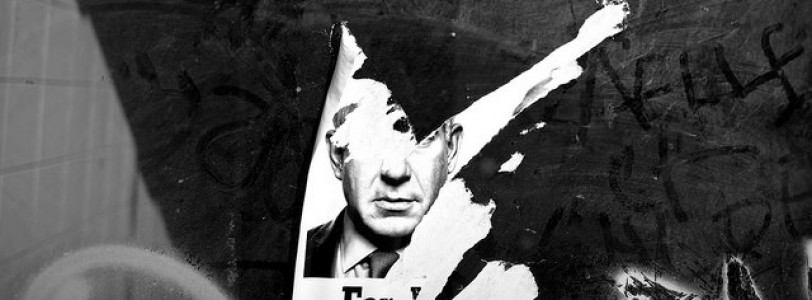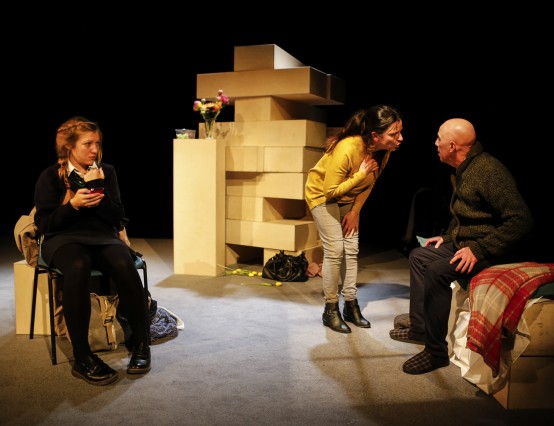As long as society has existed people have created theatre, and that theatre has been used to express opinions and garner public opinion. It is intrinsically wound into our society, from the productions that we watch onstage, to the theatrical techniques used by the politicians that run our country. In the right context, this ultimately makes it a powerful tool for social change. Examples come from all periods of history, from the church using performances to convert people to Christianity in the fourth century (Victoria and Albert Museum, 2003), to Shakespeare’s commentary on the monarchy, to Ibsen’s intense dramas revolving around society; through to more recent political renditions, such as Antony Jay and Jonathan Lynn’s Yes, Prime Minister. In these traditional contexts, the performances sought to reflect on the opinions of the public. Theatre continues to evolve and as we move into a future where performances become more accessible to participate and watch, the way that we use theatre as a tool for change must evolve too.
In a performance context, theatre does have the opportunity to change opinions, even on a controversial topic. One example of this would be Guys and Does, (Jacobs, 2012) a musical that premiered in 2009 and focused on hunting. A survey taken from the audience members before and after the performance, showed a distinct change in people’s feelings towards hunting. Those who had a more emotional response to the subject matter were more likely to have changed their opinions. By empathising with the characters on stage, we are much more likely to change our opinions and our attitudes to fit in with that ideology, if only momentarily. In Guys and Does, the character who hunted ‘ethically’ was rewarded, and the character who “models unethical behaviour, is punished and then becomes a transitional model towards positive behaviour” (Jacobs, 2012).
In this example, Jacobs states that there was “an increase in approval of hunting” from the audience. I believe this was because of the audience’s emotional involvement with the musical; because they had strong feelings throughout the show, and empathised with the characters they saw onstage, they felt able to alter their opinions on hunting. In the universe in which the play exists, there are two ways to hunt: ethically and non-ethically. The idea of not hunting at all is not addressed, and so it acts, much like propaganda, to affect change.
In my opinion, theatre that exists outside of a conventional performance context is more likely to affect change. For example, there was a group in rural Philippines that produced a piece of Theatre for Development. TfD is a form of participatory theatre, with the aim of creating and performing plays addressing issues in developing countries. The purpose is to allow communities to create theatre that “reflect[s] upon the causes for their problems and possible solutions” (Epskamp, 2006). The group’s play was rooted in traditional cultural art forms and focused on the plights of exploited child workers in Filipino sugarcane plantations. The children themselves performed the piece, including “a traditional folk song, with words written by the child labourers” (Landy & Montgomery, 2012). This piece of theatre was taken to seven schools and five communities, it ended with the children asking the audience to help them actualise their dreams for a better future. Landy & Montgomery, 2012 state that “in several rural communities the production led local politicians to adopt councils and enact laws to protect the rights of the children.” In this example, it was because the performance was inspired by traditional art forms that the audience were able to engage with it. By making the piece approachable, it was able to reach a wider audience and this made it more likely to reach somebody with the ability to enact the change, that was the original intention.
An example of local and financial change affected by theatre is Giant Spectacular: Memories of August 1914 (BBC News, 2014). The production featured several 50-foot tall marionettes, which roamed Liverpool over the course of five days. The giants were created by Royal De Luxe; a theatre company founded in 1979 and known for their expansive productions involving the puppets. An independent report on the production estimated that the economy had been boosted by £46 million over the course of the five days. The show also brought about 300,000 people from outside of the Liverpool area, with 160,000 having not visited the city before. People reportedly came from Hong Kong, Australia and France to watch the production (BBC News, 2014). These figures serve as evidence of the production bringing about change, the increase in tourism alone brought a boost to the economy and an influx of new visitors to the area. Furthermore, by making this an open-air, promenade performance, Royal De Luxe were able to make an art form that is sometimes considered elitist more accessible; anybody who wanted to see the show was able to. This example shows how change was brought to an area and its residents through theatre.
The above are all examples of theatre affecting change, whether that happens inside or outside of a traditional performance context. This does depend on different variables, from the locale of the production to its ability to engage the audience, but overall they all impacted change to varying degrees.
However, if the typical theatre audience is taken into account – white, middle-class, left-leaning and university-educated – then it could be argued that theatre serves to do little more than confirm what people already believe. This is a view shared by those who wish to criticise the arts and the progressive work that is being made. If “everyone in the arts community reinforces each other’s thinking and cold-shoulders people with different points of view”, (Vaizey as cited in Furness, 2016), then perhaps theatre cannot hope to actually change the opinions of those that it is aiming to.
A performance that outlines this idea of literally ‘preaching to the converted’ is Trinity Assembly of God Church’s Hell House (Landy & Montgomery, 2012). The production was based on the idea of a haunted house; it depicted horror-movie-style scenes of traditional Christian sins. The ‘pastor’ who took the group through the experience gave them the opportunity to ‘get right with the Lord’. The majority of people who had previously been religious accepted this redemption, although it is unknown for how long their renewed religious fervour lasted. However, when shown in New York to a non-evangelical and more sceptical audience, many found the gruesome parts of the show funny and nobody took the opportunity to seek redemption. Sarcastic comments were made by the audience and everything appeared to be taken with a heavy degree of cynicism. This example shows how theatre depends entirely on the audience that watches it. If an audience member already leans towards a certain point of view, then a production will do little more than confirm that way of thinking. In this instance, it was the religious nature of the piece, which enforced an evangelical reaction from its already religious audience. This is opposed to the scepticism it received when shown to a less devout group. When shown in New York, no one was moved to seek redemption and there wasn’t a change brought about by the piece. Hell House shows that performances that are presented to a certain demographic have little opportunity to affect change. Instead, the piece alienated people whose opinion differed from the themes of the production.
In my opinion, theatre does have the capacity to affect change in various different ways. Personally, I think theatre that focuses at a grassroots level is most likely to create performances that have genuine meaning to its audience. This is because it relates to the audience, and tackles issues that they can identify with. By engaging with the audience on a cultural, emotional and, of course, entertainment level, I think a production is more likely to affect change. Without those elements, I believe it is unlikely to have the impact it wants to. I do have to take into account my own personal bias. As someone who has been involved with the arts from a young age, I am more likely to believe in their ability to affect change. I have been impacted by theatre, and I hope to continue using theatre as a tool for change further into my career. Even taking this into account, I still believe if theatre manages to influence its audience by making them think or have conversations about an issue, then it is the first step to affecting change.
Bibliography
- BBC News. (2014, October 20). BBC News: Local News Liverpool. Retrieved November 21, 2017, from BBC News: http://www.bbc.co.uk/news/uk-england-merseyside-29681575
- Carlson, M. (1996). Performance: A Critical Introduction. Oxon: Routledge.
Coney: Project FuturePlay. (2013, September). Retrieved November 22, 2017, from Coney HQ: http://coneyhq.org/2013/10/30/futureplay/ - Coslett, P. (2012, April 22). BBC News: Local News Liverpool. Retrieved November 23, 2017, from BBC News: http://www.bbc.co.uk/news/uk-england-merseyside-17806029
- Epskamp, K. (2006). Theatre for Development: An Introduction to Context, Application & Training. London: Zed Books Ltd.
- Furness, H. (2016, October 31). The Telegraph: British arts establishment is full of 'relentlessly left-wing groupthink', former culture minister says. Retrieved March 20, 2018, from The Telegraph: https://www.telegraph.co.uk/news/2016/10/31/british-arts-establishment-is-full-of-relentlessly-left-wing-gro/
- Gardner, L. (2016, November 22). The Guardian. Retrieved November 22, 2017, from The Guardian: Theatre blog: https://www.theguardian.com/stage/theatreblog/2016/nov/22/theatre-must-speak-to-the-nation
- Jacobs, T. (2012, March 1). Pacific Standard. Retrieved November 20, 2017, from Pacific Standard: Social Justice: https://psmag.com/social-justice/musicals-have-the-power-to-change-minds-40160
- Landy, R., & Montgomery, D. (2012). Theatre for Change: Education, Social Action and Therapy. Basingstoke: Palgrave Macmillan.
- Victoria and Albert Museum. (2003, August 23). Retrieved January 18, 2017, from A History of a Night at the Theatre: http://www.vam.ac.uk/content/articles/a/a-history-of-a-night-at-the-theatre/









I really like this well researched and written piece. I suspect that your assumption that the audience preconceptions alter what they get from the performance is very true. I also suspect that many audiences don't go to the theatre to be challenged but to feel good which is why the perpetuation of ideas continues.
Having said that, I think it is changing in some ways - there is perhaps more of a trend towards challenging 'the norm' and people using theatre and other art forms to step just outside the mainstream to start people thinking on new ideas, but there are lots of options for people to find really challenging work if they want to. The fact that we even think about it in such terms is a good start. At the end of the day, perhaps just getting people to think is half the battle - trying to ensure propaganda is not just consumed as 'information' but that it is seen for what it is.
Keep up the good work - really interesting read.